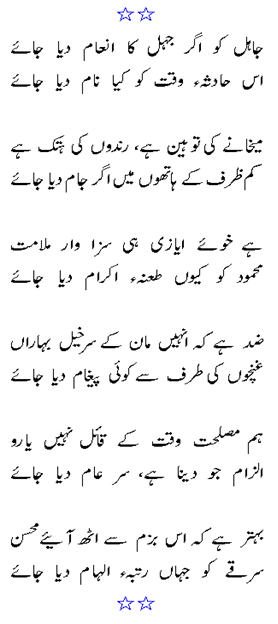Contents
Inside
better light a candle than curse darkness
This section deals with one topic only, couched in different words may be. My appeal to the readers is, to read. Read as if reading is an endless source of joy. Follows then is my appeal to writers - to write. Write with zest, convinced that the world is waiting to hear you. And therefore please put research into your writings, as much as power, that you would like to pack.
(Manzurul Haque)
PS: Soon we will add a proper Urdu Section of BaKhabar, Insha Allah.

 ..more about Ramadan in page-3 and page-7
..more about Ramadan in page-3 and page-7
Urdu Poems
Ten Points on How to Do Islamic Microfinance
Dr Mohammed Obaidullah
Large sections of Indian Muslims are poor. They also tend to get excluded from the formal banking and financial system. Though the Indian poverty alleviation initiatives have drawn world-wide appreciation, these programs show no signs of taking the religious and cultural sensitivities of the Muslims into account. A large number of indigenous Baitul-Maals have sprung up in Indian cities and small towns, as a response to this challenge. These Baitul Maals carry enormous potential within themselves and if strengthened and rejuvenated with better management and control, with injection of sound capital, greater transparency and disclosures, then these can make a dent on the poverty of millions of Muslim families. My brief suggestions on the subject are:
1. Prof Muhammad Yunus of Grameen Bank has shown us how to do microfinance without collaterals, using "group financing" and "graduated financing". Baitul Maals in India should similarly go for formation of groups (Usrah/Halaqa). A good amount of systemic effort goes into formation of these groups and one can learn a lot from the Indonesian Baitul Maals.
2. Unlike government-sponsored micro-credit programs providing lump-sum loans, Baitul Maals should provide financing in small amounts aiming at a continuous relationship with the beneficiaries and the clients. On the basis of track record of returns by a beneficiary, the amount of financing may be increased in each successive round.
3. A Baitul Maal should have clearly distinct Funds for Zakah, Sadaqa, Tamweel, and Tamin (or Takaful). Each one of these Funds should have clear accounting and control systems in place to keep track of the movement of funds. Zakah Fund should be used only for the eight categories of beneficiaries identified by the Holy Quran (9:60) and explained by the Sunnah. A major portion of Zakah Fund should ideally be earmarked for meeting consumption needs of the extremely poor and the destitute, which should include development of some skills or know-how to make them economically active. Qard Hasan from the Zakah and Sadaqa Funds should be provided to them to finance purchase of required tools or working capital to start a micro-enterprise.
4. Baitul Maals should be linked to Awqaf properties in the locality which are essentially in the nature of community-held physical assets like land, buildings etc. Such assets should be used for providing various vocational, entrepreneurial and managerial skills to make the poor “economically active.
5. Tamweel basically refers to “for-profit” financing and is targeted at groups or member-based-cooperatives, once these are in place. There are various modes of such financing, such as, Bai-Muajjal and Ijara that are similar to hire-purchase and Musharaka and Mudaraba that are basically partnerships between the client and the Baitul Maal. Such financing may be targeted at those among the clients who have crossed several stages of Qard-Hasan financing or at new clients from among the moderately-poor to generate profits that can ultimately sustain all operations.
6. A portion of the profits and membership fee may be earmarked to create a Tamin or Takaful Fund to provide a cushion to members or their family members in the event of adversities, such as, accidents, sickness, deaths and other perils resulting in loss of wealth and earning ability. 
 ...more in page-3
...more in page-3


